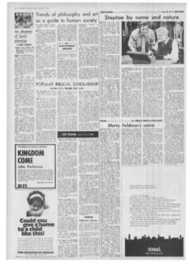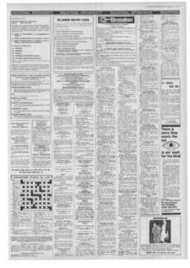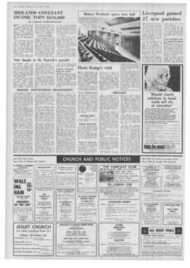Page 6, 13th March 1970
Page 6

Report an error
Noticed an error on this page?If you've noticed an error in this article please click here to report it.
Tags
Share
Related articles
Why They Laugh At The Claims Of The Catholic Left
Theology Today By Dom Peter Flood, O.s.b.
Well-informed Analysis Of Our Society
Theology And The People Of God
Aims Of The 'negative Creed'
LENT READING by Fr. S. G. A. LUFF
Culture and Theology by Brian Wicker (Sheed & Ward 1 Is.) Brian Wicker writes of institutional Christianity as dying and discusses attempts to preserve a Christian something. These approaches are secular. modernising, and radical. Secular is ready to "reinterpret" and measures by the interests of the individual.
Vatican H tried to modernise — this approach is concerned with what the community receives and tries to freshen it up. (Charles Davis in a recent article suggested that the Council anachronistically catered for fashions that were already phasing out!)
Mr. Wicker opts for radicalism, of which you do not get a clear picture; he concedes it is hard to give one. The claim is made that it catches the merits and drops the faults of the other two.
An interest of this book is that it undertakes to build up this threefold picture by discussing philosophies, fiction, and recent research in religious phenomenology. If emphasis on the authenticity of primitive man's "sense of the sacred" gains ground I can see Davis's view of Vatican II validated in the field of liturgy.
Shall we pedal back through the iconostasis?
Theology and Sanity by F. J. Sheed (Sheed & Ward 10s.) This is the oft-reprinted classic that has arranged many a consoling encounter between brains and faith. The need it was written to meet over twenty years ago is even more acute, but felt so differently that one would hardly list this today as generally recommended reading.
It would surprise me if seminarists spontaneously react with "joy," "delight" or "intoxication" to St. Thomas's five proofs! No, this once so useful apologetic sounds to me now more like intellectual triumphalism in a sort of Catholic Evidence Guild Tuileries with a mob of KUngs, etc., surging outside.
Still, students wanting a point of reference from which to measure new departures may find this useful.
The Church and Infallibility by Bishop B. C. Butler (Sheed & Ward 10s.) In 1970 Vatican I defined infallibility. In 1889 Dr. Salmon of Trinity College, Dublin, published lectures he had delivered about the time of the definition, attacking Catholic teaching. In 1952 it was seen fit to reprint Dr. Salmon's "The Infallibility of the Church," and two years later appeared a Catholic reply —this book in its first edition.
Of course, Dr. Salmon's attack was, to judge from Bishop Butler's quotes, a period piece, full of misunderstandings of what we mean and misinterpretations of history. It must have been hard enough for Bishop Butler to feel very contemporary framing a reply nearly a century after. My reaction was that, following the antique dealer's latest canon, all this sort of talk has just qualified, and can be put up for auction.
On the other hand, if you can bear all the polemic, what Abbot Butler had to say then is relevant to where Bishop Butler, and other good men, stand now.
The Old Testament by Joseph Rhymer with Derek Lance (11-16 Second Year) (Darton Longman & Todd I Is.) Joseph Rhymer edited an English edition of a French series on "The Bible in History," a popular work reviewed with well-merited praise.
This volume is intended for use by secondary teachers, the theme being "Salvation History." It is divided into lessons, made up of themes and suggestions, a "development," and further teaching material. Joseph Rhymer provides the development, sound scripture study, but not so attractively set out as the series mentioned above.
As for the teaching material, I would counsel any teacher thinking of buying the book to read at least two or three lessons. If he feels a prompt favourable response, the book will help him.
blog comments powered by Disqus











